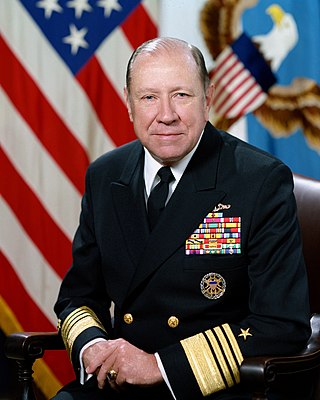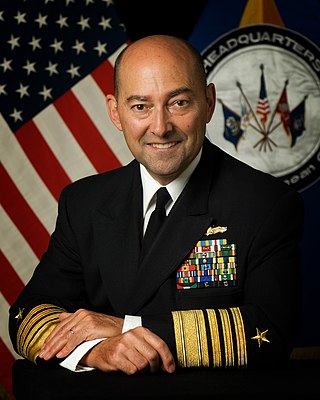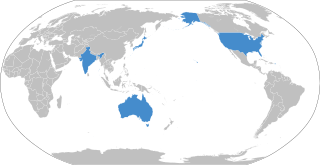
Singapore maintains diplomatic relations with 189 UN member states. The three exceptions are the Central African Republic, Monaco and South Sudan.

The United States Naval Academy is a federal service academy in Annapolis, Maryland. It was established on 10 October 1845 during the tenure of George Bancroft as Secretary of the Navy. The Naval Academy is the second oldest of the five U.S. service academies and it educates midshipmen for service in the officer corps of the United States Navy and United States Marine Corps. It is part of the Naval University System. The 338-acre (137 ha) campus is located on the former grounds of Fort Severn at the confluence of the Severn River and Chesapeake Bay in Anne Arundel County, 33 miles (53 km) east of Washington, D.C., and 26 miles (42 km) southeast of Baltimore. The entire campus, known colloquially as the Yard, is a National Historic Landmark and home to many historic sites, buildings, and monuments. It replaced Philadelphia Naval Asylum in Philadelphia that had served as the first United States Naval Academy from 1838 to 1845 when the Naval Academy formed in Annapolis.

The United States Merchant Marine is an organization composed of United States civilian mariners and U.S. civilian and federally owned merchant vessels. Both the civilian mariners and the merchant vessels are managed by a combination of the government and private sectors, and engage in commerce or transportation of goods and services in and out of the navigable waters of the United States. The Merchant Marine primarily transports domestic and international cargo and passengers during peacetime, and operate and maintain deep-sea merchant ships, tugboats, towboats, ferries, dredges, excursion vessels, charter boats and other waterborne craft on the oceans, the Great Lakes, rivers, canals, harbors, and other waterways. In times of war, the Merchant Marine can be an auxiliary to the United States Navy, and can be called upon to deliver military personnel and materiel for the military.

The Military Sealift Command (MSC) is an organization that controls the replenishment and military transport ships of the United States Navy. Military Sealift Command has the responsibility for providing sealift and ocean transportation for all US military services as well as for other government agencies. It first came into existence on 9 July 1949 when the Military Sea Transportation Service (MSTS) became solely responsible for the Department of Defense's ocean transport needs. The MSTS was renamed the Military Sealift Command in 1970.

William James Crowe Jr. was a United States Navy admiral and diplomat who served as the 11th chairman of the Joint Chiefs of Staff under Presidents Ronald Reagan and George H. W. Bush, and as the ambassador to the United Kingdom and Chair of the Intelligence Oversight Board under President Bill Clinton.
International Military Education and Training (IMET) is the title of a United States security assistance program, a type of student exchange program.
The Military Staff Committee (MSC) is the United Nations Security Council subsidiary body whose role, as defined by the United Nations Charter, is to plan UN military operations and assist in the regulation of armaments. Although the Military Staff Committee continues to exist, negotiation efforts between the United States, the Soviet Union and other nations in the late 1940s failed, and the committee has since been largely defunct, only serving in an advisory capacity.

The Munich Security Conference is an annual conference on international security policy that has been held in Munich, Bavaria, Germany since 1963. Formerly named the Munich Conference on Security Policy, the motto is: Peace through Dialogue. It is the world's largest gathering of its kind.
The Canadian Global Affairs Institute (CGAI) is an independent, non-partisan research institute based in Calgary with offices in Ottawa. Incorporated as a charitable organization in 2000, the institute seeks to focus the national debate and understanding of Canada's international policies, with the ultimate aim of ensuring a more globally engaged Canada.

The Elliott School of International Affairs is the professional school of international relations, foreign policy, and international development of the George Washington University, in Washington, D.C. It is highly ranked in international affairs and is the largest school of international relations in the United States.

James George Stavridis is a retired United States Navy admiral and vice chair, global affairs, and a managing director-partner of The Carlyle Group, a global investment firm, and chair of the board of trustees of the Rockefeller Foundation. Stavridis serves as the chief international diplomacy and national security analyst for NBC News in New York. He is also chair emeritus of the board of directors of the United States Naval Institute and a senior fellow at the Johns Hopkins University Applied Physics Laboratory.
Lieutenant-General Talat MasoodHI(M) SBt is a retired three-star rank army general, a political commentator, and a mechanical engineer.
In international relations, the term smart power refers to the combination of hard power and soft power strategies. It is defined by the Center for Strategic and International Studies as "an approach that underscores the necessity of a strong military, but also invests heavily in alliances, partnerships, and institutions of all levels to expand one's influence and establish legitimacy of one's action."
U.S. President Barack Obama's East Asia Strategy (2009–2017), also known as the Pivot to Asia, represented a significant shift in the foreign policy of the United States since the 2010s. It shifted the country's focus away from the Middle Eastern and European sphere and allowed it to invest heavily and build relationships in East Asian and Southeast Asian countries, especially countries which are in close proximity to the People's Republic of China (PRC) either economically, geographically or politically to counter its rise as a rival superpower.
LSE IDEAS is a foreign policy think tank at the London School of Economics and Political Science. IDEAS was founded as a think tank for Diplomacy and Strategy in February 2008, succeeding the Cold War Studies Centre founded in 2004. It is led by Professor Christopher Alden and Professor Michael Cox. LSE IDEAS has been ranked as the top European university-affiliated think tank and the number two university-affiliated think tank in the world.

The Quadrilateral Security Dialogue (QSD), commonly known as the Quad, is a strategic security dialogue between Australia, India, Japan and the United States that is maintained by talks between member countries. The dialogue was initiated in 2007 by Japanese Prime Minister Shinzo Abe, with the support of Australian Prime Minister John Howard, Indian Prime Minister Manmohan Singh and U.S. Vice President Dick Cheney. The dialogue was paralleled by joint military exercises of an unprecedented scale, titled Exercise Malabar. The diplomatic and military arrangement was widely viewed as a response to increased Chinese economic and military power.

The MSC Student Conference on National Affairs (MSC SCONA) is an annual conference at Texas A&M University where students and military cadets from across Texas and the United States gather to exchange ideas and discuss the role of the United States in the global community. The most recent conference, MSC SCONA 68, was held in February of 2023.
The People's Republic of China emerged as a great power and one of the three big players in the tri-polar geopolitics (PRC-US-USSR) during the Cold War, after the Korean War in 1950-1953 and the Sino-Soviet split in the 1960s, with its status as a recognized nuclear weapons state in 1960s. Currently, China has one of the world's largest populations, second largest GDP (nominal) and the largest economy in the world by PPP.










